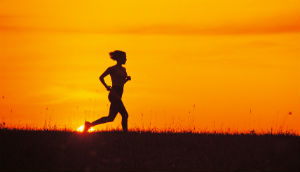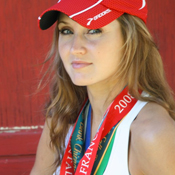On Endings
I don’t usually do my long runs in the evening. For numerous reasons, I prefer early morning long runs. There is something about the quiet of the early hours, when all the world is still asleep. Even the air itself is different—familiar and hushed and confidential, as though sharing a great secret.
And that secret, of course, is, “Coffee and pancakes await.”
 Recently, however, work and the inability to answer a 4:30 a.m. wakeup call mandated eighteen miles of an evening. It was close to 7 p.m. by the time I started, and I knew I’d be chasing the sun. I picked a meandering loop that followed a relatively quiet country road (except on Sunday mornings, when it is the main thoroughfare for church-going folk) that winds its way to a state conservation area. In this state conserved area I could run a solid half dozen miles.
Recently, however, work and the inability to answer a 4:30 a.m. wakeup call mandated eighteen miles of an evening. It was close to 7 p.m. by the time I started, and I knew I’d be chasing the sun. I picked a meandering loop that followed a relatively quiet country road (except on Sunday mornings, when it is the main thoroughfare for church-going folk) that winds its way to a state conservation area. In this state conserved area I could run a solid half dozen miles.
The first few miles were run squintingly, for I followed the country road in a westerly direction and stared directly into the sun, and then they were run easily, and then without any consideration of the sun at all, so soft and unobtrusive was the light. Before I knew it, I had made the left turn into the conservation area, and it was quiet.
I ran beneath the trees in peaceful solitude. The road was wide and completely overhung by the surrounding woods, as if by a canopy. The light beneath the trees dwindled and faded. I hadn’t expected it to grow quite so dark quite so soon. The miles clicked by… nine, ten, eleven, twelve.
After a short while, I looked around and realized I could see no more than a few feet into the woods, which were gloomy and impenetrable. Shadows danced and menaced. The sky had disappeared. Under the canopy of leaves and branches, it was night.
Even before I started my run I knew the day was ending. Still, the suddenness with which it did caught me by surprise. I’ve run enough at night—or early in the morning—to be familiar with the shadows. But this time, I felt uneasy. As the dark grew thicker and closed in around me, I grew on edge, even a bit panicky. Yes, I had known the night would arrive during my run—heck, I had chosen to run at this time—but when it actually did, I felt lost.
How did it get so dark so fast? I wondered as I ran.
Miles thirteen, fourteen, fifteen…
I ran in the shadows until, finally, I climbed the last hill out of the canopy. When I emerged back on the old country road, the sky opened up, and the dark gave way to a rich and vibrant display of pink and orange and yellow—now gold, now copper, now a bright and flaming red. The sun, as it turned out, had not finished saying goodbye, and it did so unabashedly. It poured its soul across the sky and spilled onto the earth. It burned and blazed and then, knowing time had run its course, sunk beneath the horizon and was no more.
Beneath the canopy, the end of the day had seemed frightening. Free of it, the end was breathtaking and peaceful and right.
It occurred to me, as I ran the final miles beneath a black but starlit sky, that endings can be that way—inevitable and scary and ultimately beautiful.
Every ending, whether good or bad, is an amputation. We outgrow. We move on. We stop trying to force what cannot work. But even right endings—endings we expected or wanted or catalyzed ourselves—bring sadness. They hurt and can leave us feeling lost. In those times, we need to remember there is a sky we cannot see. And this sky, so invisible to us, is our reality. We are simply beneath the canopy.
For all the power and heat of the day, nature shares its secrets in endings and beginnings. In the tenderness of the morning, the promises are easy to decipher. But in the evening, when night fast approaches and the day comes to a close, they must be remembered.
An end is simply the end of one thing, not all things. That is why the sun takes its time in closing up the day: to reassure us. With a brilliant array, it reminds us of the coming morning. And with a last tremendous effort, it cries out, “Even now, there is beauty. Even now, things are right.”

Amy L. Marxkors is the author of The Lola Papers: Marathons, Misadventures, and How I Became a Serious Runner and Powered By Hope: The Teri Griege Story. Click here to receive Amy's weekly article via email.
Connect With Us
see the latest from Fleet Feet St. Louis